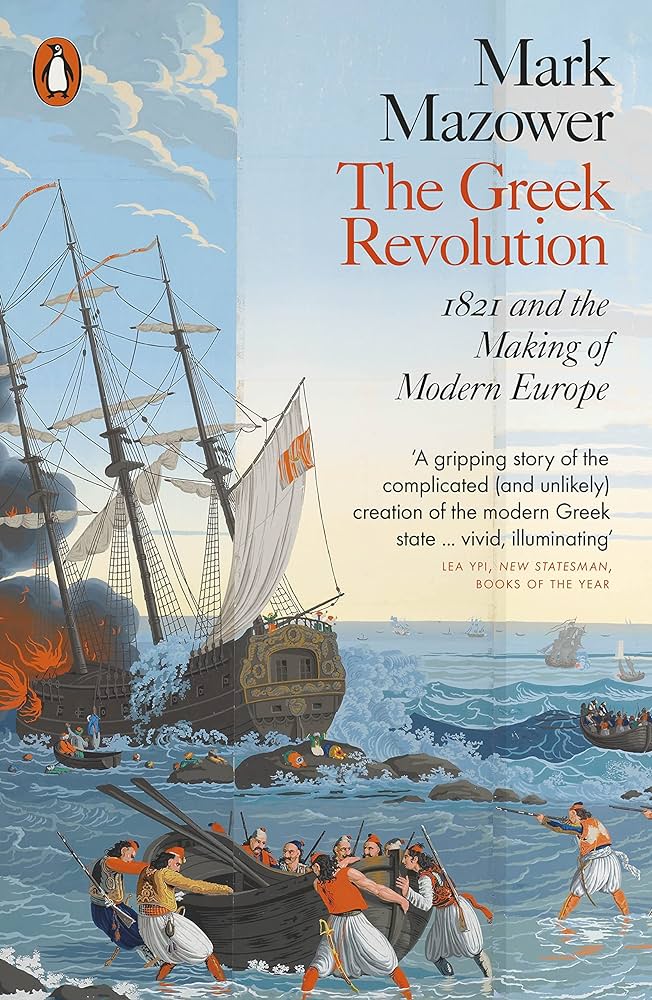|
The Greek Revolution: 1821 and the Making of Modern Europe
By Mark Mazower Published in November 2021 608 Pages Thibault’s Score: 4/5 This dinosaur-sized book isn’t for everyone. It is very long and detailed. Finishing it was a project. It also is a little bit on the complicated side, so I wouldn’t recommend it to people who don’t already have a lot of background knowledge. That being said, I am very glad that I took that time to plow through this tour de force of Greek history. The Greek war of independence from the Ottoman Empire is one of the most fascinating events in 19th century history. It isn’t just important because it marks the birth of a major European nation and the end of the Ottoman Empire - it ties into nearly all major trends that were reshaping Europe at the dawn of the industrial revolution. I will summarize just some of the mind blowing details from this book in this review. Breakdown of Society: Sometimes, societies completely break down. This results in looting, rape, killing, and destruction of cultural heritage. Warlords emerge. In the 21st century, we have seen this when authoritarian governments collapse. Examples include Syria, Libya, and Somalia. In all three countries, a totalitarian state destroyed all forms of non-state organization such as private enterprise, religious organizations, and local communities. As a result, when the state collapsed, the vacuum became extremely dangerous. Greece during the time right before the war of independence is a perfect example of this. Greek Expats: Revolution was fostered by large communities of Greeks living outside of the Ottoman Empire. First, there were the many parts of Greece proper outside of Ottoman control such as the British Ionian Islands, the Venetian colonies, and areas controlled by Christian Balkan states. Then, there were cities such as Odessa in Russia with large Greek populations. These areas fostered the revolution, free from the scrutiny of Ottoman eyes. The Age of Revolutions: The American Revolution, the French Revolution, the Napoleonic wars, and the South American wars of independence against Spain were all part of the broader “Age of Revolutions.” This was a time when the ideas of liberty, stoked by radical liberals, swept across the European world. Many Greek nationalists were influenced by these ideas. The Greek revolution would also be supported by foreign ideologues in places like France, Britain, and Italy. Many of the European philhellenes would be veterans of the Napoleonic wars hoping to restart the pan-European revolution. Philhellenism: Europeans romanticized Greece. The European image of Greece wasn’t shaped by the realities of its long term occupation by the Ottoman Empire. Instead, it was shaped by ancient legends from Homer, Aristotle, and Rome. As a result, many European liberals volunteered to help in Greece. They would get killed, ripped off, and scammed by the Greeks. Many were ill prepared for war, and were shocked by the atrocities that they saw there. British Banking: The British successfully captured the energy of the Greek revolution. Around 1822, they started encouraging British philhellenes such as Lord Byron to go to Greece. This diluted the ultra-liberal sentiment, making the philhellenic movement both more moderate and more legitimate. The British started issuing loans to finance some of the sides of the Greek war of independence. British money unified the many disparate warlord factions. As a result, the British had a major say when it came time to form an official Greek government, going as far as handpicking the first Greek monarch. Greece would become a sort of British puppet state after 1832 until late in the 19th century. The writing style is decent. It isn’t anything special; but it's clear and concise considering the topic. Mazower gives just the right amount of background information - not too much, not too little. The sheer length and complexity of this book makes it hard to recommend. If you are studying the right topics, and have the right background information, then this is a great book. I wouldn’t recommend it to a more casual reader though.
0 Comments
Leave a Reply. |
Thibault SerletMost of my articles are book reviews, but I also write about many other topics. Archives
December 2023
Categories |

 RSS Feed
RSS Feed